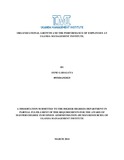Organisational Growth and the Performance of Employees at Uganda Management Institute
Abstract
The study aimed at finding out how organizational growth affected performance of staff at Uganda
Management Institute. Specific objectives included; (1) to examine the relationship between
organizational growth (rate of student intake) and performance of staff at UMI, (2) to assess the
relationship between organizational growth (number of training programs) and performance of
staff at UMI. The study followed both quantitative and qualitative research approaches and it was
mainly quantitative using a descriptive design. Sampling was done using Yamane’ (1967:886)
formula which generated a sample of 116 respondents for the questionnaires and there were 29
purposively selected respondents. Data was collected using questionnaires, interviews using
interview guides, observation and documentary reviews. For administrative staff, organizational
growth had a beta value = 0.743 and was statistically significant (at sig = .01 level) to staff
performance. For the faculty, organizational growth had a beta value = 0.770 and was statistically
significant (at sig = .01 level) to staff performance. For administrative staff, the training
programmes had a beta value = .848 and had statistically significant contribution to staff
performance. For the faculty, training programmes had a beta value = .782 and has statistically
significant contribution to staff performance. This indicates that there was significant relationship
existing between these variables. The study concluded that there is a significant relationship
between institutional growth and the performance of staff and that the number of training programs
has a significant relationship with staff performance at UMI. The study recommends that before
UMI management continues with the expansion programme, it should ensure that issues regarding
staff performance are well articulated and considered and also the infrastructure needed for the
expansion is in place so as to avoid straining the existing infrastructure.

